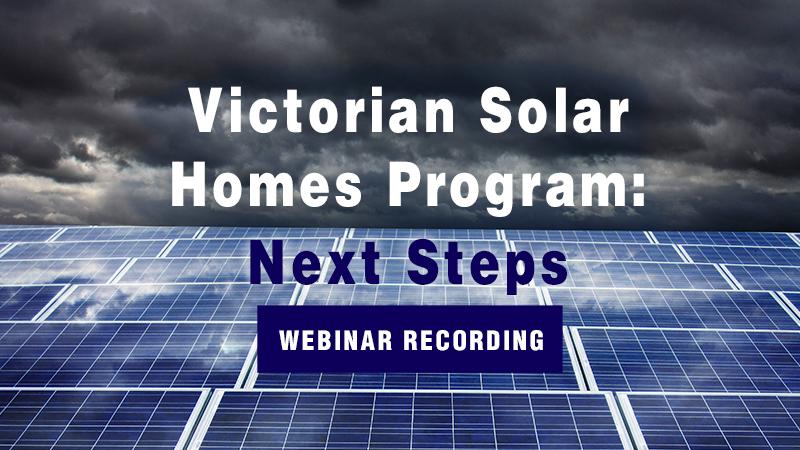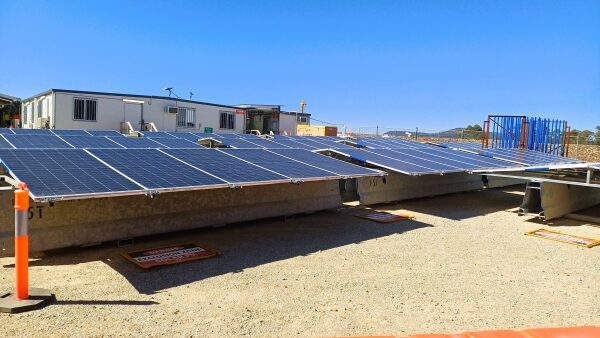The SEC is one of several industry bodies calling for urgent changes to Victoria’s Solar Homes Program to alleviate its resultant boom-bust cycles which have brought the industry to, in the words of one emotional solar company representative, “a grinding halt.” Solar Cutters, a solar community group, currently has a petition urging action, which had attracted more than 1,300 signatures at the time of writing.
Since pv magazineAustralia began covering the story this week, Grimes has met with government representatives, including Victorian Minister for Energy, Environment, Climate Change and Solar Homes Lily D’Ambrosio. The meeting took place to relate the effects of the Solar Homes Program to a Government which, in Grimes’ words, “thinks its program is good and popular.” Though there seems to be an enormous gap between the Government’s perception of the program and the reality on the ground – particularly as it relates to the installer community.
Steady business evaporates
Grimes related the stories of many solar installation companies which have seen their steady business dry up to virtually nothing since April, when the Government stalled the already intermittent intake of rebate applications and approvals. Grimes argues that the industry is seriously concerned with the highly volatile impacts the program is having in terms of creating rapid and arbitrarily limited peaks, and elongated troughs.
One larger installer Grimes spoke to, who typically performs 80 installs a month, has performed only one single install since April, and that was for a customer who was not eligible for the rebate. All of the smaller installers Grimes spoke to reported zero business since April.
Some solar businesses have been forced to lay off staff, and even close their doors entirely. “His [a solar installer Grimes spoke to] business is on the line,” said Grimes, “his life savings is on the line, his house is on the line, he’s just had to sack his good and loyal employees. They’ve all got families, they’ve all got mortgages, to be in that position is absolutely heartbreaking… He tells me that he’s now in touch with Beyond Blue, and he fears others in the industry will start doing drastic things.”
Grimes related many more first-hand stories of layoffs, businesses in real jeopardy, and an inability to process enough potential business through the Solar Victoria portal. Grimes related that he told D’Ambrosio “to carve out some time and make those phone calls herself, to speak to people in the industry and hear those stories.
“The phones have stopped ringing, the debts are mounting, the fixed costs remain unchanged: The rent remains unchanged, all the running costs remain unchanged, but you can’t have expenses without income in business, that’s called economic suicide, and that is what the whole industry is facing,” said Grimes.
One SEC member, who Grimes quoted directly, described the effect of the scheme as being as if “the government has their foot on the accelerator and the brake at the same time.”
Reportedly, all of the SEC members Grimes spoke to reported feeling that they would be better off with no scheme at all, as opposed to the scheme as it currently exists. “100% of the people that I spoke to were very emotional,” said Grimes, “in every case I had to play the role of counsellor, because these are real people, real businesses, real families, real workers, right across Victoria, and they’re absolutely devastated.”
Problems with the program
Grimes distilled the two major problems brought on by Solar Homes. Firstly, the application process is a bureaucratic nightmare, “a dog’s breakfast, it’s outrageous, overdone, unnecessary.” And secondly, there is simply too much demand and not enough supply in terms of the rebates. The 3,333 successful applicants in the most recent round of the scheme work as an arbitrary cap on the industry, not an extension of a growth to it. As some industry actors noted, if there had been no scheme at all, they would have done more business over the course of the same period.
In terms of the application process itself, it also favours younger homeowners. The level of technological know-how required of householders to pass through the four stages of authentication required to access the scheme’s portal is biased against many Australians, particularly retirees, looking to cut their electricity bills. In contrast, the application process is more suitable for younger people, who are well known to be unable to afford homes in Australia, let alone solar installations to place on the roofs of those homes.
Installer desperation mounts
The feeling of desperation in the industry is palpable. One solar company representative, Peter, who participated in the SEC webinar even speculated that the Government is purposefully torpedoing the solar PV industry on the behalf of the electricity companies.
Elias, another company owner who is on the verge of losing everything, noted that in Victoria “we’ve got the best rebate in Australia, but the industry has come to a grinding halt. Meanwhile companies in ACT and New South Wales are putting staff on and they don’t have a rebate to speak of. That should say it all.”
Moreover, it should be added that this is not simply an issue for consumers and solar installers. The effects extend further because as solar businesses go under, all of their past customers will be losing support under installation guarantees. This is an issue, argued Grimes, for everybody in Victoria who has solar.
Suggested changes
The SEC advised the Government to abolish the approval process outright, and install in its place a simplified validation process requiring only the provision of a rates notice and a signed statutory declaration from the homeowner.
The SEC also advised changes to the scheme should be made before August 1. Such changes could include halving the rebate figure and doubling the intake figure.
According to Grimes the Government was “categorical, there will be no change in the number, the rate or the threshold of the program.” However, “the minister did say she was open to having a conversation with the industry about transition funding.”
Mobilisation
After meeting with the D’Ambrosio, the SEC’s position is now, “that change in this program is possible, but any change by the government will be proportionate to the amount of pressure it feels on this issue. If the government feels very little, uncoordinated or no pressure at all, little change can be expected,” said Grimes, “though I think with significant pressure, significant change is possible.”
After an outpouring from the SEC’s members and the Victorian solar industry in general, the SEC is now coordinating a significant campaign over the next two weeks, for “if radical change is not made by the first of August, then there are massive consequences… it will be a bloodbath in the industry.”
The SEC is organising a multifaceted attack of pressure from both consumers and industry actors on their local members of Parliament, a concerted social media outcry, media attention, and possibly a Solar Rally on the steps of Victorian Parliament. “This is not our first rodeo,” said Grimes, “Smart Energy Council runs campaigns, and we win.
The SEC is asking for customer stories, and for both customers and industry effected people to contact their local member of parliament.
If you’re an installer doing it tough at the moment, don’t hesitate to give Beyond Blue a call.
This content is protected by copyright and may not be reused. If you want to cooperate with us and would like to reuse some of our content, please contact: editors@pv-magazine.com.









“The 3,333 successful applicants in the most recent round of the scheme work as an arbitrary cap on the industry, not an extension of a growth to it. As some industry actors noted, if there had been no scheme at all, they would have done more business over the course of the same period.”
What is this a specious cap on the number of systems that can be installed? Where are the big players? Where’s TESLA, LG Chem, Simpliphi and even Enphase Energy, has a system that can use the micro-inverters and have energy storage for later electric rate spikes.
“The SEC is asking for customer stories, and for both customers and industry effected people to contact their local member of parliament.”
Just how many of the (Parliament) have their own solar PV system?
The solid reputable companies will last the rest will fall.
It’s been nothing but a race to the bottom with cheaper and cheaper inferior products and prices offered. Dodgy installs and roofs covered in garbage isn’t helping anyone except crooks that leave the industry as quickly as they come in.
Over 750 solar companies have gone broke in the last 7 years and its all because of STC and LGC grant grabs and now the Victorian government rebates.
If you work on unsustainable margins and cut corners at every turn you shouldn’t be in business.
Well down Mr Andrews, a calculated fightback against an industry riddled with crooks.
The problem for the government will be finding a political out. They’ve promised a rebate to consumers, at a certain level. They can’t simply expand the rebate, that will blow the cost out. They need to trim and spread it, or redirect it entirely to renter, low income etc. But someone will have to work out how they’ll phrase all that so it doesn’t seem like a broken promise. How about, ‘The unanticipated level of demand for the benefits of PV means that we need to conserve taxpayer funds by ensuring the program is targeted as beneficially as possible, to help ordinary Victorian to access the benefits of solar. Therefore…’
The industry needs to think from the Government’s point of view. The Government has tried to do the right thing, in the face of federal inaction. Make it as easy as possible for the government to change its position. They need to ‘pivot’.